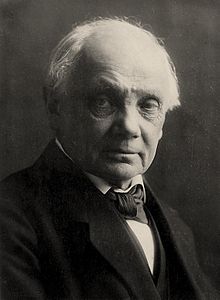Harald Høffding
This article has multiple issues. Please help improve it or discuss these issues on the talk page. (Learn how and when to remove these messages)
|
Harald Høffding | |
|---|---|
 Harald Høffding c. 1915 | |
| Born | 11 March 1843 Copenhagen, Denmark |
| Died | 2 July 1931 Copenhagen, Denmark |
| Era | 19th-century philosophy |
| Region | Western philosophy Danish philosophy |
Main interests | Theology, Psychology |
Harald Høffding (11 March 1843 – 2 July 1931) was a Danish philosopher and theologian.
Life
[edit]Born Høffding was born in Copenhagen, the son of businessman Niels Frederik Høffding and Martha Høffding (née Jhellerup). The family lived at the corner of Gammeltorv and Nørregade. Høffding became a schoolmaster, and ultimately in 1883 a professor at the University of Copenhagen. He was strongly influenced by Søren Kierkegaard in his early development, but later became a positivist, retaining and combining with it the spirit and method of practical psychology and the critical school.[2] The physicist Niels Bohr studied philosophy from and became a friend of Høffding. The philosopher and author Ágúst H. Bjarnason was a student of Høffding.
Høffding's great-nephew was the statistician Wassily Hoeffding.
Høffding died in Copenhagen.
Work
[edit]His best-known work is perhaps his Den nyere Filosofis Historie (1894), translated into English from the German edition (1895) by B.E. Meyer as History of Modern Philosophy (2 vols., 1900), a work intended by him to supplement and to correct that of Hans Brøchner to whom it is dedicated. His Psychology, the Problems of Philosophy (1905) and Philosophy of Religion (1906) also have appeared in English.[2]
Among Høffding's other writings, most of which have been translated into German, are Den engelske Filosofi i vor Tid (1874); Etik (1876); Psychologi i Omrids paa Grundlag af Erfaring (ed. 1892); Psykologiske Undersøgelser (1889); Charles Darwin (1889); Kontinuiteten i Kants filosofiske Udviklingsgang (1893); Sören Kierkegaard als Philosoph (1896); Det psykologiske Grundlag for logiske Domme (1899); Rousseau und seine Philosophie (1901); Mindre Arbejder (1899).[2]
Commemoration
[edit]A commemorative plaque on the facade of Alexandrahus in Copenhagen (Nørregade 1) commemorates that Høffding was born on the site.
Selected publications
[edit]- Harald Høffding, 1891 "Outlines of psychology". 1891. Retrieved 2010-09-25.
- Harald Hoffding, 1906 "The Philosophy of Religion". Retrieved 2012-07-26.
- Harald Høffding, 1919 "A brief history of modern philosophy". Retrieved 2010-09-25.
- Harald Høffding, 1920 "Modern philosophers; lectures delivered at the University of Copenhagen during the autumn of 1902, and lectures on Bergson, delivered in 1913". Retrieved 2010-09-25.
References
[edit]- ^ Favrholdt, Martin (2007-03-21). Niels Bohr's Philosophical Background. Copenhagen, Denmark: Royal Danish Academy of Sciences and Letters. ISBN 9788773042281.
- ^ a b c One or more of the preceding sentences incorporates text from a publication now in the public domain: Chisholm, Hugh, ed. (1911). "Höffding, Harald". Encyclopædia Britannica. Vol. 13 (11th ed.). Cambridge University Press. p. 561.
External links
[edit] Works related to Harald Høffding at Wikisource
Works related to Harald Høffding at Wikisource- Works by Harald Høffding at Project Gutenberg
- Works by or about Harald Høffding at the Internet Archive
- Works by Harald Høffding at LibriVox (public domain audiobooks)

- Presentation of Harald Høffding, in portuguese
- 1843 births
- 1931 deaths
- 19th-century Danish philosophers
- Danish schoolteachers
- University of Copenhagen alumni
- Academic staff of the University of Copenhagen
- People from Copenhagen
- Rectors of the University of Copenhagen
- Spinoza scholars
- Corresponding fellows of the British Academy
- 20th-century Danish philosophers
